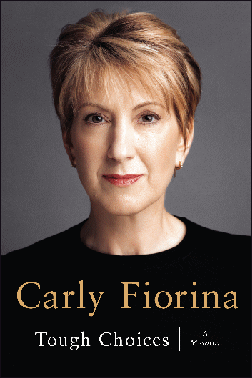MOUNTAIN VIEW, Calif. — The parking lot at the Computer History Museum started filling up before 7 a.m. The buzz inside the sold-out event here was akin to a major product introduction.
But it wasn’t a new tech doodad that attracted a hall full of Silicon Valley execs and media; it was former HP CEO Carly Fiorina promoting her new book, Tough Choices, A Memoir.
The venue for Fiorina’s talk seemed appropriate, as there has never been a case quite like her controversial reign as CEO, subsequent firing by the board of directors and the privacy leak scandal involving that same board that followed.
Even without the leak investigation, Fiorina’s tell-all book would have attracted attention.
She engineered the company’s merger with Compaq, overcoming bitter shareholder dissent, some of which came from a group led by the son of legendary HP co-founder Bill Hewlett, and some of which was because she stirred up HP’s vanilla image with glitzy media events and appearances.
Sporting a bright red blazer and her famous toothy grin, Fiorina answered questions from Forbes Silicon Valley Bureau Chief Quentin Hardy in a casual, seated interview format. The event was put on by the Churchill Club, one of several in Fiorina’s book tour.
Tough Choices starts with her firing by the HP board. She said the board, who she described as “dysfunctional,” never explained why she was fired.
Her own assessment is that the reasons were largely personal and related to her concern over boardroom leaks.
After stories about HP’s strategy, based on confidential board discussions, appeared in the Wall Street Journal, Fiorina addressed the board directly about the issue and emphasized leaking information to the press wasn’t acceptable.
 |
Fiorina’s tell-all book. Source: Penguin Group |
Within a few weeks Fiorina said she thinks some board members concluded “we don’t have to take this anymore.”
Later she said the HP was “… faced with an emotional set of events, about how the company should be organized … some people decided to put that on the front page of the Wall Street Journal to pressure the situation”
Former board member George Keyworth has admitted to being the source of some of the press leaks and fellow ex-board member Tom Perkins later confirmed he was a second unnamed source for some stories.
Bud Michael, CEO of Availigent, was one of several dozen people waiting in line after Fiorina’s talk to get a copy of her book signed.
He said he could relate directly to what Fiorina discussed because he had been dismissed as CEO earlier in his career without explanation by the board of a small company.
“What she’s talking about does happen,” Michael told internetnews.com. “What’s missing from all the coverage about the HP leaks is that board members leaked information and that was a great breach of fiduciary responsibility.”
He gives Fiorina credit for her attempts to speak plainly about the problems HP faced.
“Most people prefer to be liked and not be confrontational, but sometimes you have to be if you want to get anywhere.”
While many are now giving Fiorina credit for righting the HP ship, she recalled that “many in the Valley thought I deserved to be fired; clearly the media did.”
But however perturbed the board might have been over her attempts to plug leaks, the larger, lingering issue was the bruising battle she led to complete the largest merger in the tech industry with Compaq, and the fallout from the 36,000 layoffs that followed.
“I think the negative press and pressure on the stock price absolutely created pressure on the board,” said Fiorina.
The problems on the board exploded under her successor Mark Hurd’s watch and the pretexting scandal that ensued. But Fiorina defended a lot of the board’s work during her tenure.
“Until the vote to fire me, every vote was unanimous, and every one the result of a very deliberate debate and decision-making process.”
One of those votes was the operational plan for 2005, which HP went on to execute with great success after Fiorina’s departure.
On other topics, Fiorina said it was “ridiculous” she was named the most powerful woman in business by Fortune in 1998 ahead of Oprah Winfrey and others.
She said she didn’t like the ranking of top execs, which makes it seems more like a tennis tournament than a meritocracy where everyone has an equal chance to succeed.
While some criticized her as a celebrity CEO for her decision to give a keynote at the Consumer Electronics Show and other high-profile media appearances, she said such decisions were always made with an eye to how it could help HP, a company she said was too rooted in its past and “afraid to face the future.”
“It was hugely important to take the HP brand, that was known as stodgy and increasingly irrelevant, and, with all due respect, middle-aged white man … and move it forward to something hip, forward-looking and relevant.”
She also noted several other tech CEOs followed her lead in keynoting the CES show.
“Appearing on Oprah, which I was asked to do, didn’t help HP so I didn’t do it,” said Fiornia. She also said she declined requests for profile interviews in Vogue and People for the same reason.
Fiorina defended the $21 million pay package she received after leaving HP, though she admitted it was “more money than I ever dreamed I’d make.”
Fiorina said she gave up an employment contract in favor of a package of incentives she said was “utterly consistent with the rest of the team.”
She also noted that while some CEO salaries are outrageous, it’s often the surprise of finding out about it after the fact, as in the backdating of options, when companies don’t make the details transparent at the time they’re given.


